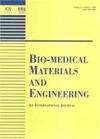金结合白藜芦醇纳米粒子对胶质瘤细胞的影响及其内在机制
IF 1.3
4区 医学
Q4 ENGINEERING, BIOMEDICAL
引用次数: 0
摘要
背景:胶质母细胞瘤是侵袭性最强、预后最差的脑肿瘤。虽然已知白藜芦醇(Rsv)对胶质瘤有治疗作用,但金结合白藜芦醇纳米颗粒(Rsv-AuNPs)对胶质瘤细胞的作用却鲜有报道。目的:我们旨在研究Rsv-AuNPs对胶质瘤细胞的影响及其内在机制。方法:用不同浓度的 Rsv-AuNPs 处理人胶质瘤细胞系 U87。CCK-8、Transwell和伤口愈合试验分别测定了Rsv-AuNPs对细胞增殖、侵袭和迁移能力的影响。流式细胞术检测 Rsv-AuNPs 对细胞凋亡的影响。通过 Western 印迹检测与细胞增殖、侵袭、迁移和凋亡相关的蛋白质表达变化。此外,还使用 PI3K 抑制剂 LY294002 验证了 Rsv-AuNPs 在 PI3K/AKT/mTOR 信号通路中的抑制作用。结果:Rsv-AuNPs能显著抑制U87细胞的增殖、迁移和侵袭(P均为0.05),提高细胞凋亡率(P为0.05)。与增殖、迁移、侵袭和凋亡相关的蛋白质的变化一致(均为 P < 0.05)。此外,Rsv-AuNPs 处理可明显抑制 U87 细胞中 PI3K、AKT 和 mTOR 蛋白的磷酸化(P < 0.05)。结论:本研究发现,Rsv-AuNPs 可抑制 PI3K/AKT/mTOR 信号通路的激活,从而抑制 U87 细胞的增殖、迁移和侵袭,并诱导细胞凋亡。未来,通过更深入的动物和临床研究,Rsv-AuNPs 或可应用于胶质瘤的临床治疗。本文章由计算机程序翻译,如有差异,请以英文原文为准。
Effect of gold-conjugated resveratrol nanoparticles on glioma cells and its underlying mechanism
BACKGROUND: Glioblastoma is the most aggressive brain tumor with poor prognosis. Although Resveratrol (Rsv) is known to have therapeutic effects on glioma, the effects of gold-conjugated resveratrol nanoparticles (Rsv-AuNPs) on glioma cells are rarely reported. OBJECTIVE:We aimed to investigate theeffects of Rsv-AuNPs on glioma cells and its underlying mechanism. METHOD:Human glioma cell line U87 was treated with different concentrations of Rsv-AuNPs. CCK-8, transwell, and wound healing assay were performed to measure the effects of Rsv-AuNPs on cell proliferation, invasion, and migration ability, respectively. Flow cytometry assay was used to detect the effects of Rsv-AuNPs on apoptosis. Changes of protein expressions related to proliferation, invasion, migration, and apoptosis were measured by Western blot assay. In addition, the inhibitory role of Rsv-AuNPs in the PI3K/AKT/mTOR signaling pathway was verified by using PI3K inhibitor LY294002. RESULTS:Rsv-AuNPs treatment significantly suppressed proliferation, migration, and invasion of U87 cells (all P < 0.05) and increased the apoptosis rate (P < 0.05). The changes of proteins related to proliferation, migration, invasion and apoptosis were consistent (all P < 0.05). Moreover, Rsv-AuNPs treatment significantly inhibited the phosphorylation of PI3K, AKT and mTOR proteins in U87 cells (P < 0.05). CONCLUSION:The present study found that Rsv-AuNPs inhibited the proliferation, migration, and invasion of U87 cells and induced apoptosis by inhibiting the activation of PI3K/AKT/mTOR signaling pathway. In the future, Rsv-AuNPs might be applied to the clinical treatment of glioma through more in-depth animal and clinical research.
求助全文
通过发布文献求助,成功后即可免费获取论文全文。
去求助
来源期刊

Bio-medical materials and engineering
工程技术-材料科学:生物材料
CiteScore
1.80
自引率
0.00%
发文量
73
审稿时长
6 months
期刊介绍:
The aim of Bio-Medical Materials and Engineering is to promote the welfare of humans and to help them keep healthy. This international journal is an interdisciplinary journal that publishes original research papers, review articles and brief notes on materials and engineering for biological and medical systems. Articles in this peer-reviewed journal cover a wide range of topics, including, but not limited to: Engineering as applied to improving diagnosis, therapy, and prevention of disease and injury, and better substitutes for damaged or disabled human organs; Studies of biomaterial interactions with the human body, bio-compatibility, interfacial and interaction problems; Biomechanical behavior under biological and/or medical conditions; Mechanical and biological properties of membrane biomaterials; Cellular and tissue engineering, physiological, biophysical, biochemical bioengineering aspects; Implant failure fields and degradation of implants. Biomimetics engineering and materials including system analysis as supporter for aged people and as rehabilitation; Bioengineering and materials technology as applied to the decontamination against environmental problems; Biosensors, bioreactors, bioprocess instrumentation and control system; Application to food engineering; Standardization problems on biomaterials and related products; Assessment of reliability and safety of biomedical materials and man-machine systems; and Product liability of biomaterials and related products.
 求助内容:
求助内容: 应助结果提醒方式:
应助结果提醒方式:


